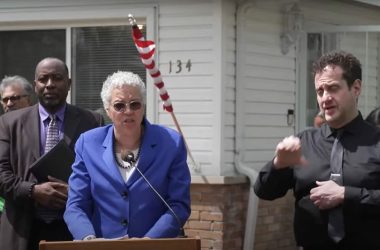Action Includes Release of 21 New Datasets; Mandates that Each City Agency Release Datasets and Empowers the Chief Data Officer to Build on the Success of Chicago’s National Leadership on Open Data
CHICAGO–(ENEWSPF)–December 10, 2012. Mayor Rahm Emanuel today signed an Executive Order mandating that city agencies publish public data sets under their control as well as update them on a regular basis. The Executive Order will expand upon Chicago’s national leadership in open data by establishing a lasting framework for future releases and empowering the Chief Data Officer (CDO) to continue developing datasets by working collaboratively with representatives from City departments and sister agencies.
“An open and transparent administration makes it easier for residents to hold their government accountable, but it also serves as a platform for innovative tools that improve the lives of all residents,” said Mayor Emanuel. “Chicago’s vibrant technology and startup community will leverage this wealth of open, public data to create applications that will improve service delivery and lead to greater quality of service for residents and more public engagement in City government.”
The Mayor’s Chief Data Officer will coordinate implementation of the Executive Order by establishing reasonable timelines, implementation plans, and review processes to promote increased online public access to city agency data sets. At the start of his term, the Mayor created the position of CDO to coordinate the City’s open data policy and lead data analysis initiatives to improve city decision-making and management, and today’s Executive Order ensures that the position will be maintained and strengthened for the remainder of the Mayor’s time in office.
As an immediate next step, the CDO will convene an Open Data Advisory Group consisting of open data coordinators appointed from each City agency, which will assist the CDO in establishing timelines for implementing the Executive Order.
“By making more data available to residents and developers, we are better able to move past administrative and technical hurdles so that we can find solutions to City’s most complex problems,” said Brett Goldstein, the City’s Chief Data Officer and Commissioner of the Department of Innovation and Technology.
To commence a new phase in the City’s ongoing efforts to increase transparency and accountability, the City is also releasing 21 new datasets to the City’s data portal. These datasets include the Chicago Traffic Tracker, which will provide data on traffic congestion on Chicago’s arterial streets in real-time by continuously monitoring and analyzing GPS traces received from Chicago Transit Authority (CTA) buses. Congestion estimates will be produced every ten minutes to measure the current estimated speed for about 1250 segments covering 300 miles of arterial roads. In addition to Traffic Tracker, the City is releasing a lookup table that will enable residents to determine whether any environmental records exist for a given address, a map of locations in Chicago where residents can drop off recycling, a map of liquor moratorium districts in the city, and a database of abandoned vehicle service requests. Full descriptions and links are included with this release.
Since Mayor Emanuel took office, the city has overhauled the City’s data portal, data.cityofchicago.org, which now hosts more than 400 datasets and has been viewed 2.5 million times. Notable datasets include “Current Employee Names, Salaries and Position Titles,” which publicly displays the salary for every employee of the City of Chicago, a searchable version of the City’s budget, and more than 5 million crime incident reports spanning ten years. To improve City services through data driven decision-making, the Mayor launched a citywide data collection project led by Chapin Hall and financed through a $300,000 grant from the MacArthur Foundation to document citywide data and consolidate it into a singular data platform that will improve City operations, services and analytical decision-making. In addition, the City, State, and County have joined forces to launch MetroChicagoData.org, the nation’s first “convergence patch” site that brings public data from multiple governments into a single open portal to help increase service efficiencies, access to vital information and new innovation. Information Week recently included Metro Chicago Data in its top 15 Government IT Innovators for 2012. In August 2012, Chicago partnered with the Federal government, New York City, San Francisco, and Seattle to launch Cities.Data.Gov. In September, Mayor Emanuel partnered with Code for America to announce the launch of Chicago’s new “Open311” service request system, which allows Chicagoans to track service requests from the time they are submitted and receive an email when the issue is resolved through a new “311 Service Tracker.” The system also allows residents to submit photos with service requests, encouraging more accurate and detailed reporting of issues to City departments.
As a result of these and other efforts to improve transparency and accessibility of City data, Chicago received a national transparency award from the Sunshine Review, a national nonprofit organization dedicated to government transparency, and the City of Chicago website received an A+ grade.
Source: cityofchicago.org








